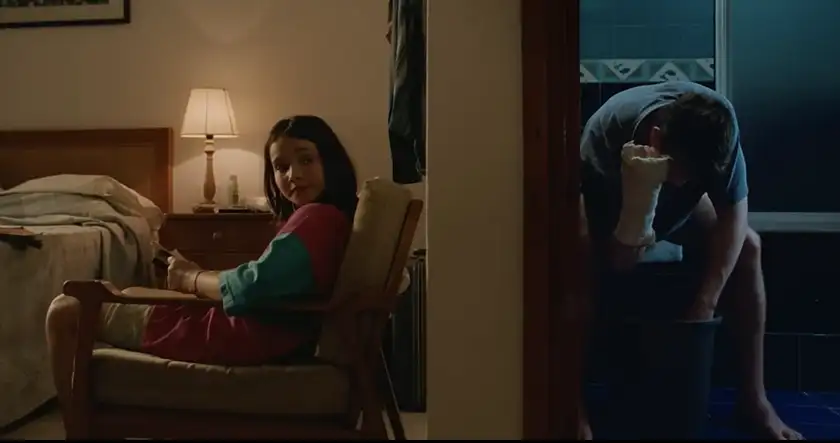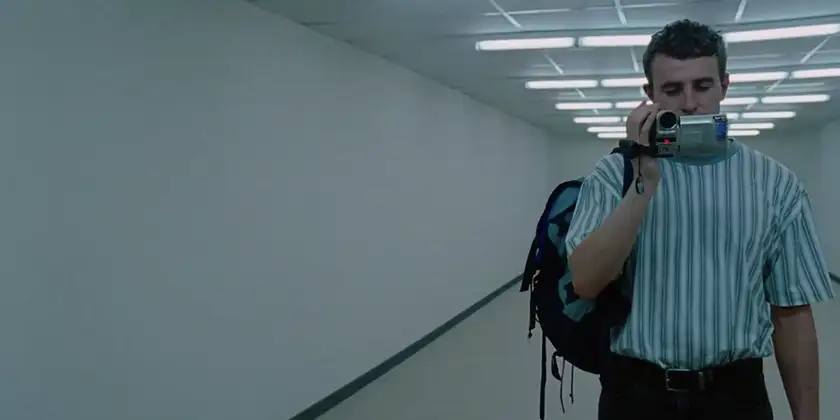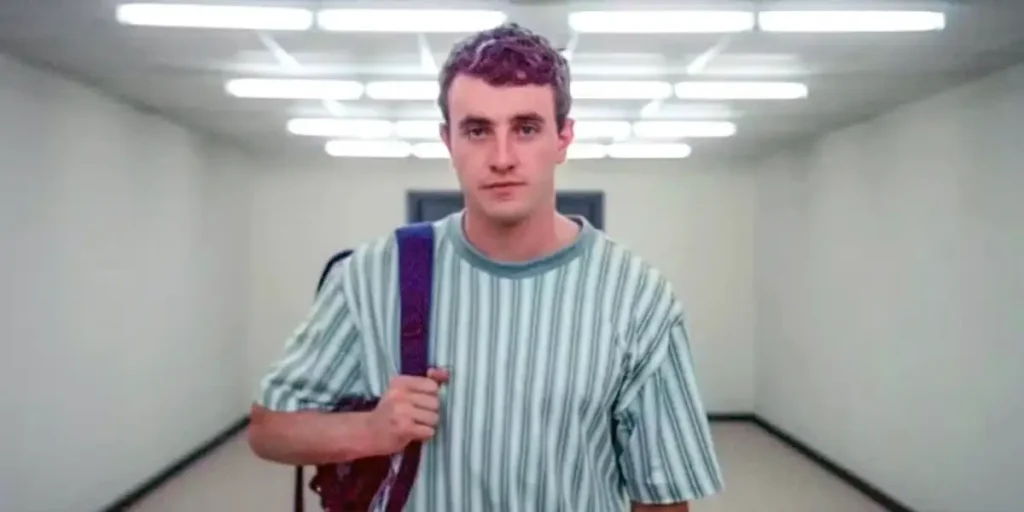The ending of Aftersun conveys Calum’s painful emotional state as he walks away from Sophie: here’s the last scene of the film explained!
Author: Akash Deshpande
Aftersun is one of the most acclaimed films of this decade, which also earned an Oscar nod. Since it was a debut feature, it came as a pleasant surprise at the time of its release. Scottish filmmaker Charlotte Wells, who had written and directed three short films before she made the movie, decided to turn her personal story into her feature directorial debut. She drew inspiration from her past and the bittersweet relationship she shared with her late father and turned it into Aftersun. Loosely based on her childhood, this indie charmer follows 11-year-old Sophie spending her holiday at a Turkish resort with her father on his 31st birthday.
Aftersun does not fit in the studio conventions of storytelling and offers a rather fluid portrait of a part of Wells’ past. It shows her protagonist looking back at her memories to reconcile with her father. A big part of Aftersun is shot on a handycam and the resulting near-pixelated footage conveys the fuzziness of Sophie’s memories. Despite its unorthodox approach to narration, the film was unanimously praised for its writing, direction, editing, and acting performances across the globe upon release, with recognition from the Cannes Film Festival, the BAFTAs, the Gotham Awards, and the Oscars.
While the film’s central relationship resonated with the viewers, the ending left them with something to ponder. Many viewers must have had long-winded discussions trying to get the ending explained. So, allow me to elaborate on why the final moments of Aftersun resonated with us despite its ambiguity.
What happens in Aftersun?
Charlotte Wells’ Aftersun is a semi-autobiographical account of her bittersweet relationship with her father. While the movie is a coming-of-age tale, it also works as a gorgeous time capsule that reveals what it was like to grow up in the late 1990s. The film mainly covers the time 11-year-old Scottish girl Sophie Patterson (Frankie Corio) spends with her 30-year-old father, Calum (Paul Mescal, of Gladiator 2) in a Turkish holiday resort. It shows parts of the footage that Sophie captures on her handycam during this trip. These dreamlike snippets are intertwined with the duo’s shared experiences.
To understand Aftersun, let’s first learn where the characters come from. Calum got into a relationship with Sophie’s mother at a fairly young age. He moved to London after separating from her mother. So, the trip to Turkey allows him a chance to bond with Sophie. While staying at the resort, Sophie befriends a few teenagers and surprises them with her skills at playing pool. Calum watches her play while being mistaken for her older brother, owing to his young age. Later, she also hangs out with Michael (Brooklyn Toulson), a boy who’s roughly her age.
At other times, she spends time with her father and observes him almost like he is an alien to her. She feels emotionally distant from him since she has spent most of her childhood away from him. We see these events unfold through the perspective of 20-year-older Sophie as she watches her past tape recordings and recounts her memories. So, we see the film essentially through her perspective.
Calum and Sophie’s Relationship
As a father, Calum is deeply protective of Sophie. He brings self-help books to read, practices tai chi in his spare time and teaches her some self-defence techniques. He feels guilty for living away from her for the most part and hopes to make it up through these gestures. However, he is still fairly young to responsibly father a tween, which is reflected in his contrasting behaviour. He applies aftersun lotion to soothe her skin and ensures she does not feel bored. However, he gets upset at her for losing her diving glasses. On one side, he is caring, while on the other, he is impulsive and immature. After diving, Sophie realises that he is upset since the glasses cost him quite a bit. So, she apologises to him. He pretends not to be bothered by it.
Later, Calum invites Sophie to play water polo but forgets about her once he steps into the pool. He gets into the competitive spirit of the sport and rides on the high it offers him. It feels like he is desperately trying to make up for his lost youth that he spent either worrying about his financial incompetence or familial responsibilities. While doing so, he ignores how she feels. That evening, Sophie decides to sing R.E.M.’s “Losing My Religion” with her father. However, Calum leaves her to sing on her own. After her performance, he suggests she take lessons to improve her singing skills.
Sophie gets annoyed that it was the first thing he thought of asking her. He neither apologised to her for abandoning her on the stage nor for ignoring her in the pool. She takes out her anger by making him feel bad for promising something he cannot afford to pay for. So, Calum impulsively abandons her and goes to the beach. On his way, he picks up someone else’s cigarette and hides his smoking habit from Sophie in general. Since he acts irresponsibly, Sophie needs to find a way back by herself. He stays under the burden of his unfulfilled potential and regrets his lost youth. It keeps him away from being a responsible father.
Sophie’s Adolescence
As an 11-year-old, Sophie feels the things that any child would in their early adolescence. She joins a group of teenagers for a swim and notices a couple kissing underwater. She leaves the water with its indelible impression. The night Calum abandons her, she meets them again and observes them as they have drinks while feeling left out. A girl offers her a bracelet to lift her spirits. Sophie innocently parades it around. While finding her way back to the resort, she meets Michael. By the end of the night, she kisses him. Back at the resort, she notices two men kissing each other, from a distance.
Sophie observes these people passionately expressing their desires and embarks on her own awkward, gradual journey toward adulthood. Eventually, she returns to their room to find her father lying naked on the bed and covers him.
Calum’s Guilt and Depression
As an adult stepping into his thirties, Calum reads self-help books and learns self-defence techniques to be a good role model for Sophie. He regrets his absence in her life and desperately wants to make up for it. We see him trying his best during their trip for her to have a good time. However, he falls back into his self-destructive behavioural pattern stemming from deep emotional pain over the regrets from his early adulthood. After diving, he speaks with the instructor about his work, who reveals his grandmother pressuring him to find a more responsible job.
Calum listens to him speak as he contemplates this life path while analysing the state of his life. As a 31-year-old, Calum is unsure if he will make it to forty. Back in the room, Sophie asks him whether he is currently at the stage he imagined to be as a child. He gets emotional and shuts her down. Later, he briefly reflects on his past self and notes how he can never return to the place he has left. The day after abandoning Sophie, he apologises to her. She forgives him and asks the tourists to sing “For He’s a Jolly Good Fellow” to celebrate his birthday. That day, he urges her to be honest with him about her life and trust him as a reliable father figure.

Back in his room, we see him sobbing by himself. All these subtle hints indicate Calum’s depression which often keeps him away from the moment he is experiencing. Even when he experiences something cheerful, he shies away from embracing it.
Aftersun Ending Explained and Rave Scene Analysed
At the end of Aftersun, we see Calum and Sophie have a meal together to end his 31st birthday. He asks her if she had a good holiday and gets a picture taken of them together. To end their holiday on a high note, he takes her to dance to Queen & David Bowie’s “Under Pressure”. She hesitantly joins him for a dance and slowly embraces his enthusiasm. Later, Calum takes her to the airport and records her as she walks away. About twenty years later, Sophie sees the footage Calum recorded that day. The final moments of Aftersun show Calum packing that camera after waving goodbye to Sophie and walking down an eerily empty airport hallway.
Calum opens the door at the end of the hallway to enter a rave scene. It is similar to the ones we witness throughout the film where older Sophie looks for Calum dancing in the crowd without a care. Amid flashing lights, we see the older Sophie trying to embrace him as he falls back into a void. So, the recurring rave scenes in Aftersun convey Calum slipping through Sophie’s grasp as she tries to paint a picture of him based on her memories. She craves to experience the same embrace she did while dancing with him.
On the other hand, Calum walks back through an eerily empty hallway suppressing his overbearing sadness because he needs to return to bear the burdens of his grown-up life after being content with Sophie. We see him enter the rave scene, which serves as a space for him and Sophie to reconnect even if practically impossible. The fragmented frames give a sense of frozen time for Sophie, who hopes to remember her father through this lens at a time when he was unabashedly happy. So, the ending reflects Sophie’s burning desire to reconnect with her father through these fragmented pieces of her memory.

The Old Tapes, Sophie’s Memories, and Calum’s Departure
The ending of Charlotte Wells’ Aftersun is ambiguous and left open to interpretation. Throughout the film, we see 30-year-old Calum struggling with depression and loneliness. So, the final scene of him walking away reveals his painful emotional state. Sophie’s departure sucks the life out of him, which explains why there is no one else around him as he walks away. It is unclear whether it leads him to take a tragic step and commit suicide even though the script hints at the possibility through the scene of him falling back into the void as the older Sophie tries to embrace him in the rave.
About two decades after their trip, Sophie lives with her wife and their young child. She watches the tapes she recorded back then and considers a fuller picture of her father. Being at the age that he was at the time and having gone through a fair share of experiences as an adult, she understands him better. So, the tapes allow her to see her father’s flaws, vulnerabilities, and depression through an empathetic lens based on a similar lived experience instead of a judgemental one. Besides, now a parent herself, she can understand his struggle with raising a child, which makes her more compassionate toward him.
Aftersun is now available to watch on MUBI, on digital and on demand.

